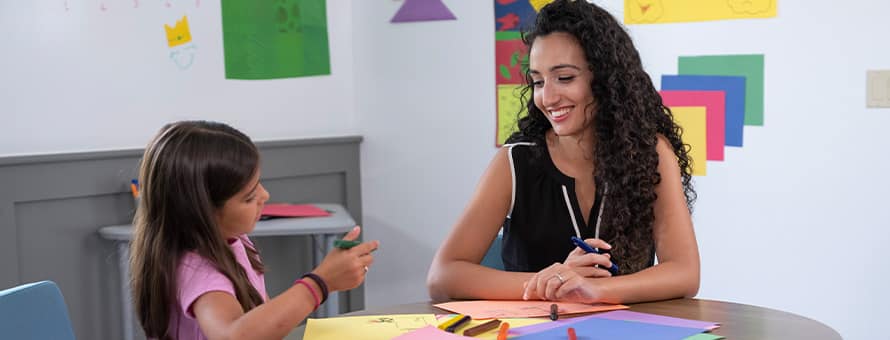How to Become a Child Psychologist

Know before you read
At SNHU, we want to make sure you have the information you need to make decisions about your education and your future—no matter where you choose to go to school. That's why our informational articles may reference careers for which we do not offer academic programs, along with salary data for those careers. Cited projections do not guarantee actual salary or job growth.
You might be interested in child psychology if you're passionate about helping children. To become a child psychologist, you likely need to earn a relevant doctorate degree and become licensed in the state where you work, according to the U.S. Bureau of Labor Statistics (BLS). But there are plenty more positions you can find to help children, teens and their families with a master’s or even a bachelor’s degree.
What Does a Child Psychologist Do?

Child psychologists can work with children, teens and families in a variety of settings, from private practice to social service agencies, schools, treatment facilities and more. Some also focus on research, said Dr. Barbara Lesniak, executive director of social science programs at Southern New Hampshire University (SNHU).
Lesniak, who has been at SNHU for over a decade, holds a Doctor of Psychology. She has 15 years of experience providing online and in-person counseling services, specializing in virtually helping clients in acute crisis situations.
“Most child psychologists enter the field because they want to help youngsters,” she said. “In all of these roles, they help children directly or work in roles like advocacy or designing educational programs.”

If you enjoy working with kids, child and adolescent psychology could be a great field for you, said Sara Cramer, MS, CCLS, CIMI, an adjunct psychology instructor at SNHU and Certified Child Life Specialist.
As young people are dealing with more stress, there's a growing need for psychology professionals. According to the Boys & Girls Clubs of America, there has been an increase in anxiety and depression in youths in the past few years.
"Children and adolescents are faced with more stress and anxiety than ever before, and they will need the support and advocacy of child psychologists," said Cramer, who has worked as a childcare provider, preschool teacher and behavioral specialist consultant.
Child psychologists are well suited to helping children and adolescents cope with the stressors in their lives that may affect their behavior or emotional well-being, including things like grief, divorce, bullying and more, according to Cramer.
“They also work with children who experience developmental issues such as autism, attention deficit hyperactivity disorder, obsessive-compulsive disorder, learning disabilities, etc.,” she said.
Child psychologists also work to assess children for many of those diagnoses, as well as depression and other mental health disorders using an array of cognitive and achievement tests. Many also choose to focus in different areas of psychology, including developmental psychology, abnormal psychology or adolescent psychology.
How Long Does It Take to Become a Child Psychologist?
“The journey to becoming a child psychologist takes years to complete,” said Cramer. It requires certain education and licensure.
Many child psychologists begin with a bachelor’s degree in psychology, and you may be able to choose a concentration in child and adolescent development.
"Focusing on child and adolescent psychology during the undergraduate years is a great place to start on the journey to becoming a child psychologist," said Cramer. "The knowledge a student would gain during this time would provide a solid foundation for master-level courses."
You might pursue a master’s degree in child and developmental psychology after earning an undergraduate degree.

It’s also essential to research your state’s specific licensing and supervision requirements. All but a few states require child psychologists to have a doctorate. (SNHU does not currently offer a doctorate in psychology.) You will also need to complete a number of hours of supervised work and pass a state licensing exam, said Dr. Thomas MacCarty, associate dean of social sciences at SNHU.
“Apart from the educational requirements and state guidelines to become licensed, child psychologists need to be well-grounded emotionally and psychologically,” MacCarty said.
MacCarty worked as a licensed school psychologist for over 20 years before moving into higher education.
What Career Paths are Available in Child Psychology?
Different roles are available within the child psychology field based on education level. If you aren't sure what level of education you want to pursue yet, you might consider starting with a bachelor's degree.
Undergraduate Degree
Although many roles require further education, not all do.
"There are many paths a student can pursue with a degree in psychology concentrating in child and adolescent development," said Cramer.
Some career paths might require additional certifications, but according to Cramer, a bachelor's degree might allow you to work in roles like:
- Elementary or preschool teacher
- Probation officer
- Social service assistant
- Substance abuse counselor
An undergraduate degree can also open up opportunities in juvenile detention facilities, childcare facilities, government social work agencies and opportunities to work as a life coach or developmental or behavioral specialist, MacCarty said.

Graduate Degree
While you will probably need a doctorate degree to become a licensed and practicing child psychologist, earning a master's degree is still an important step. It can also open doors to other areas in the field.
Most people with a master’s in child psychology can work in many of the same settings as a licensed psychologist in supportive roles, Lesniak said.
“The biggest difference is the ability to work independently and to be licensed. Those with a graduate or doctorate degree will be able to get a professional license to practice if they meet the requirements,” he said. “There are far more opportunities available for someone with a graduate or doctoral degree and more earning potential.”
According to BLS, in 2023, master's degree holders earned a weekly median salary of $1,737 versus $1,493 for those with a bachelor's degree.*
According to Cramer and MacCarty, at the master's level, you may find work in roles such as:
- Art or music therapist
- Behavioral specialist
- Case manager or social worker
- Child advocate
- Child or developmental psychologist
- Community service manager
- Family therapist
- Mental health or school counselor
“The one caveat (is that) there may be additional coursework, experience or supervised hours needed for licensing to meet the requirements for the different jobs available,” MacCarty said.
The type of job you do as a child psychologist can depend on the kind of work that most interests you. Since many go into the field to help young people, many “gravitate toward jobs like doing individual or family therapy, running group therapy sessions, working with children caught up in the court system or helping children with special needs and their families negotiate the education system,” Lesniak said. Others prefer to focus on research or academia.
“While they don’t provide direct services, they add critical pieces to the body of knowledge in the child psychology field,” she said.
Find Your Program
What Skills Do Child Psychologists Need?
Like many liberal arts and social science disciplines that rely heavily on soft skills, a child psychology degree program will help you build adaptable and transferable skills like communication, analysis and more. You will also need to master field-specific theory and be familiar with commonly used tests, assessments, research techniques and methods to work with children and families, Lesniak said.
“These types of programs provide a broad range of skills, as well as knowledge that’s very specific to the field of child psychology,” she said.
Cramer said flexibility is a vital skill for a child psychologist, as well as verbal and non-verbal communication and listening skills.
“Since students will be working with children who have special needs or those who have experienced a trauma, it is very important to be compassionate, enthusiastic and trustworthy,” she said. “In my own opinion, it is important for students to know how to adapt to changing situations. If the plan in mind does not work, one needs to be quick to develop a new plan.”
Education can change your life. Find the SNHU psychology program that can best help you meet your goals.
*Cited job growth projections may not reflect local and/or short-term economic or job conditions and do not guarantee actual job growth. Actual salaries and/or earning potential may be the result of a combination of factors including, but not limited to: years of experience, industry of employment, geographic location, and worker skill.
Joe Cote is a writer and organic marketer at Southern New Hampshire University (SNHU), where he has worked since 2016. Previously he spent more than a dozen years as a reporter and editor at weekly and daily newspapers in Vermont and New Hampshire. He lives near SNHU's Manchester, New Hampshire campus with his wife and daughter. Connect with him on LinkedIn.
Explore more content like this article

Academic Spotlight: Dr. Laman Tasch, Associate Dean of Academic Strategy, Social Sciences

Why Earning His BA in Political Science Mattered to Anthony Fernandez

What Can You Do With a Master’s in Criminal Justice?
About Southern New Hampshire University

SNHU is a nonprofit, accredited university with a mission to make high-quality education more accessible and affordable for everyone.
Founded in 1932, and online since 1995, we’ve helped countless students reach their goals with flexible, career-focused programs. Our 300-acre campus in Manchester, NH is home to over 3,000 students, and we serve over 135,000 students online. Visit our about SNHU page to learn more about our mission, accreditations, leadership team, national recognitions and awards.


